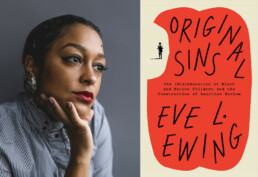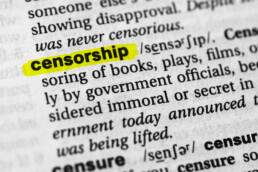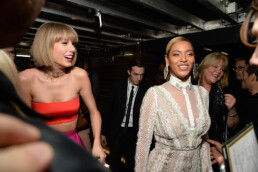Can you talk about abortion in therapy?
February 18, 2025NEWS,NEWSLETTER
 February 18, 2025 Fair Monduesday, Meteor readers, I am still emotionally recovering from watching my two husbands reunite during the Saturday Night Live 50th anniversary special. I am, of course, talking about José Pedro Balmaceda Pascal Melero and Benito Antonio Martínez Ocasio Melero. Yes, they took my last name because we’re a very progressive throuple. In today’s newsletter, we try to understand what you can and can’t talk about with your therapist in abortion-ban states. Plus, a big payday for the athletes at Unrivaled. I love all my husbands equally, Shannon Pascal Ocasio Melero  WHAT'S GOING ONHow do you feel about that?: Therapy couches are sacred spaces, where people are encouraged to say anything and everything to process, heal, and move forward. But what happens when you live in a place like Texas or Mississippi, and the thing you need to talk about is an abortion that your state has made illegal? “I have this fear of bringing this subject up to my therapist because lines can get very blurry with mandated reporting,” one young Texas woman told Public Health Watch in a story released last week. The woman, who chose to remain anonymous, said she had used abortion pills to terminate a wanted but risky pregnancy and has been grieving ever since. But she feels she can’t work through that grief with a professional because of the “climate of fear” in anti-abortion states, where conservatives promise that anyone seen to be aiding and abetting abortion will be punished. How concerned should folks in therapy be? In most states, social workers and healthcare professionals are also mandated reporters, meaning they have an obligation to report any known or suspected abuse, child neglect, or intent to commit harm—so it’s understandable to be concerned that in a state that criminalizes abortion, a therapist could be pressed to report. But patient confidentiality laws are extremely clear about what qualifies as abuse or harm, and so far, abortion has not qualified. Still, the abortion laws in Texas, with their bounty rewards, are written just vaguely enough that healthcare professionals across fields are unsure of exactly what their clients can say to them or how they can respond, according to Public Health Watch’s reporting. As usual, the chaos is the point. “The intention behind these laws is to stoke confusion and fear so that people don’t seek abortion care and that providers are afraid to provide abortion care and that functionally people stop talking about it altogether out of fear,” Lucie Arvallo of the Texas reproductive rights group Jane’s Due Process told Public Health Watch. But as much as abortion ban states may try to fearmonger, confidentiality laws still protect those in therapy. If you’re concerned your therapist may not be trustworthy, you have options and, more importantly, you have rights. A mental health professional cannot share your name, contact information, or session notes without your consent or a subpoena from law enforcement. More suggestions for addressing the issue (and finding a new therapist if you need one):
AND:
 COLLIER AND THE NATASHA CLOUD DURING A GAME EARLIER THIS MONTH. (VIA GETTY IMAGES)
 FOLLOW THE METEOR Thank you for reading The Meteor! Got this from a friend?
|
![]()
The “Recurring Lies” We Learn in School
February 15, 2025NEWS,NEWSLETTER
As our country marks Black History Month by banning books about race from classrooms, writer Eve L. Ewing looks at the long, complex “miseducation” of Black and Native children.
BY REBECCA CARROLL
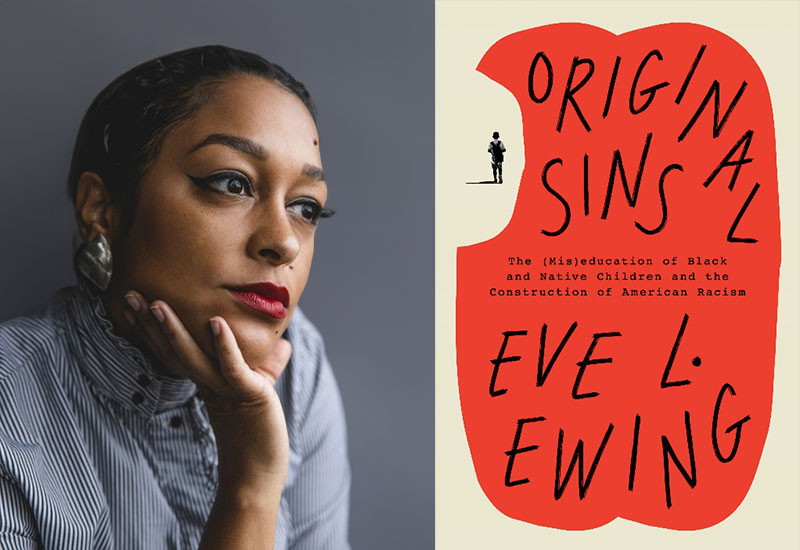
AUTHOR EVE L. EWING WANTS YOUNG PEOPLE TO “UNDERSTAND THEIR OWN RADICAL POWER."
It’s been less than a month of the second Trump administration, and already in its crosshairs is the Department of Education. Trump has pledged to abolish it, issued an executive order threatening to defund schools engaging in discussions around race and oppression, and has empowered Elon Musk, a white male billionaire who grew up under the racist apartheid system of South Africa, to cancel $900 million in research grants. If there is a next level of “hope,” we need it now—and no one embodies hope, especially when it comes to education, more than poet and scholar Eve L. Ewing. Her new book, Original Sins: The (Mis)education of Black and Native Children and the Construction of American Racism, approaches the issue of disparity in education—specifically for Black and Native students—with the revelatory question of, “What if American schools are doing exactly what they are built to do?”
From the earliest efforts to offer schooling to formerly enslaved Black people—efforts that were met consistently with questions of whether or not Black people were human enough to be educated—to the compulsory boarding school attendance of Native children with the aim of “civilizing” them, Original Sins unearths the DNA of America’s education system, and lays bare the ways in which our knowledge has “been impacted, and to some degree, severed by colonialism.” And as Trump cuts DEI initiatives in American universities and colleges, one note from the book resonates: Schools, Ewing writes, “have never been for us.” But, she continues, regarding the education system as a whole, “The good news is that people made it, and people can unmake it—and make new things.”
Rebecca Carroll: It seems that from the start, the educational attitude toward Black folks was: We’ll give you subpar resources, but will (mostly) leave you alone as long as you stay away from us (white folks). While for Native Americans, it was: We’re going to steal your children, and destroy all their cultural ties to you. Why were the educational strategies used against Black folks and Native Americans so different from one another? Or were they?
Eve L. Ewing: The United States was founded on land that was violently stolen from the Native people who had lived here since time immemorial, and that land was tilled by enslaved Africans who were stolen from their homelands, degraded, and treated as property. Those foundational thefts enriched the nation at the expense of the lives, land, and dignity of Black and Indigenous peoples. And those actions didn’t happen in one discrete moment—they continue to reverberate in the world we live in today.
So in order for the country to sustain itself, it has required an intellectual underpinning that justifies those evils. It requires a set of recurring lies, to make it all seem okay. And that’s where schools come in: a place to make the lies seem real. Three of those lies that I talk about in the book are: the lie that Black people and Native people are intellectually inferior, the lie that our bodies and our children’s bodies inherently require more discipline and control, and the lie that we are destined for economic subjugation, that it’s our fate in life to lie at the bottom of a capitalist hierarchy.
There are ways that anti-blackness and anti-indigeneity use the same weapons, but there are indeed ways that the strategies diverge. And the reason for that is that white supremacy has historically needed different things from us. It has needed Black people to be subservient, and it has needed Native people to be gone. That’s how I would put it simply.
RC: What do you think is the responsibility of educators who began their careers when the official default was white supremacy? Is there a process of undoing (not a punishment) that needs to occur for teachers of all races who, for perhaps decades, taught children of all races through the lens of racial hierarchy?
ELE: It’s a hard question. I think it’s important to begin by centering ourselves in relationships. All of us—in our personal lives, in our work lives—have had moments when we thought we were doing our best, and it’s made clear to us that the people we loved were not served by our choices. When that happens, we have a choice to make: Do we choose to be defensive, or do we take the opportunity to be reflective? If someone takes the time to try to teach you to do better, to be better, that’s an act of love. Are you able to receive that love, or not? Are you able to be accountable for your actions? That’s a question for folks to ask themselves. At the same time, we need to be making space for people who are radically caring and transformative to enter the profession.
RC: Speaking of undoing racist teachings, you cite the work of scholars Eve Tuck and K. Wayne Yang, who disparage the “easy use” of the word “decolonize.” They note that in recent years, social justice activists have suggested “decolonizing” certain spaces and ideology…but in doing so have actually trivialized the word. Is it not possible, though, for an easy use of a term to also be effective?
ELE: I think the question has to be, effective for what? …Real decolonization is not easy, and if a violent colonial institution continues to profit from harms against Indigenous peoples, having a single book or training or workshop or affinity group and then saying that that is “decolonizing” could be not only misleading—it could be actively dangerous, because it gives people a facile representation of what decolonization is. It reminds me of a moment in 2020 when the university where I work declared that they were committed to anti-racism, which could not have been further from the truth. So I see it as less of a scholarly conversation, and more of a “say it with your chest” conversation, or a “don’t just talk about it, be about it” conversation.
RC: In a recent piece for In These Times, you wrote: “It’s not enough to be afraid of the laws and rules we don’t want to see in schools.…Who are the young people you love most….What are the values you hold dear that you want desperately for them to understand, to inherit?” To your young beloveds, or simply to your readers, what are the values you hold dear that you want desperately for them to understand, and to inherit?
ELE: Thank you for that question! I want the young people in my life to understand their own radical power to love: to love themselves, to love others, to love the lands and waters and more-than-human relatives, and to understand how strong we are collectively when we turn that love into action. I want them to voraciously seek out stories in all forms and to see themselves as storytellers. And I want them to understand Chicago history and the history of great Black artists who shaped culture as we know it.
A President-Free Newsletter
February 13, 2025NEWS,NEWSLETTER
 February 13, 2025 Dearest Meteor readers, Ahead of Presidents Day, we’ve decided to give you a break from all things presidential. (That means we won’t be covering the Linda McMahon confirmation hearings today or her terrifying education agenda, but don’t forget to call your senators.) Enjoy this reprieve while it lasts! Also, you heard it here first: Our annual Meet the Moment event is coming up on International Women’s Day, March 8! It’s a day of intergenerational conversations and performances with women and nonbinary people of all ages—past speakers include everyone from Jane Goodall to America Ferrera, so get ready!! And grab your tickets now. Today, we dig into some ‘70s feminist history, offer a bit of good news out of Kansas, and ask author Haley Mlotek three questions about divorce. Saging the space (for now), Nona Willis Aronowitz  WHAT'S GOING ONThree Marias, full of grace: Maria Teresa Horta, a Portuguese folk hero who helped spark a feminist movement in her country, died last week at the age of 87. She was the last surviving member of a trio known internationally as the Three Marias, who in 1972 published Novas Cartas Portuguesas (New Portuguese Letters). The book was a ragtag compendium that told the story of women’s oppression under dictatorship in Portugal. Their backstory: In 1971, Horta, Maria Isabel Barreno, and Maria Velho da Costa—all well-established writers in their thirties—started meeting weekly for consciousness-raising sessions and bringing notes, fantasies, and letters to one another. Apparently inspired by the 17th century classic “Letters of a Portuguese Nun,” these dispatches discussed everything from rape and domestic violence to abortion and forbidden orgasms. The three women eventually published a collection of these musings, vowing never to reveal which of them had written each fragment.  AN EXTREMELY DOPE MURAL OF THE THREE MARIAS BY ELTON HIPOLITO IN VILA NOVA DE CERVEIRA, PORTUGAL It was a juicy, racy, defiant text that flew in the face of everything Prime Minister’s Marcelo Caetano’s authoritarian regime stood for. It was also a direct challenge to the censors, who had recently banned one of Horta’s volumes of poetry. “Let us put an end to mystifications and false modesty, let us cleave from top to bottom the waters we are drowning in without being able to draw a single breath,” they wrote. “Hasn’t the time come to share with each other, for example, the truths we know about our pleasures in bed?” They weren’t kidding: Throughout, there was straight-up erotica, about “tumescent fruit” and “silk buttocks” and “fingernails scraping your skin.” As expected, the book was banned—but not before it had become an overnight sensation and sold out almost every copy. The Three Marias were swiftly arrested and imprisoned, charged with "abuse of the freedom of the press" and "outrage to public decency.” Caetano declared them three women "who aren't worthy of being Portuguese." The dustup, of course, helped them become internationally famous, garnering the support of icons like Simone de Beauvoir and Adrienne Rich. They were eventually acquitted in 1974 on the heels of the dictatorship’s demise. The Three Marias’ legacies are a reminder that desire for sex and liberation can pierce through even the most repressive governments. Looking back in 2014, Horta recalled that their meetings were her oxygen during an extremely dark time. It “was the most interesting thing of my life,” she said. “It is a book that grabs you because it is a book of political struggle.” AND:
 KANSAS GOV. LAURA KELLY MEANS BUSINESS. (VIA GETTY IMAGES)
 Three Questions About…DivorceAuthor Haley Mlotek’s new book is a tender meditation on the transformative nature of dissolution. The “divorce narrative” has dominated lately, from Leslie Jamison’s Splinters to Lyz Lenz’s This American Ex-Wife to Miranda July’s All Fours, all of which focus primarily on the author’s individual liberation. But writer Haley Mlotek’s new book, No Fault: A Memoir of Romance and Divorce, stands out because it situates her personal story within the complex, painful and sometimes beautiful social history of divorce. Mlotek—a divorced writer with divorced parents, one of whom is a certified divorce mediator—excavates how the dissolution of marriage shaped the last century, and all the unique little heartbreaks and triumphs each divorce leaves in its wake. I spoke with her about divorce’s gravity, its role in this political moment, and how it intertwines with romance. Nona Willis Aronowitz: For me, being divorced is a badge of honor; it was proof I actually did something about my unhappiness. In the last pages of your book, you also admit to feeling kind of attached to your divorced status. In what ways do you think your divorce has shaped you and your desires? Haley Mlotek: There was a slight and almost morbid comedy to saying that I was divorced in the immediate aftermath — I had been married so briefly…and among my friends I was certainly one of the youngest people anyone knew who was going through a divorce. It was easy to turn this moment from my recent past into a joke, or a fun fact, or an easy anecdote in those days. Later, as more people in my life experienced some of the same things I had in my breakup and divorce, I thought more deeply about what that status actually meant to my present moment and my future. There’s a gravity to the status that’s not so easily explained, which I think has actually served me well — rather than relying on easy answers or quips, I had to think carefully about what I actually wanted to share, and most of that was some variation of …"I don't know, and maybe I never will." NWA: Besides your personal story, you lay out the fascinating history of divorce itself, and by extension, marriage—including how both intertwined with feminist movements. What role do you think divorce plays (or should play) in discussions of gender and feminism during this regressive political moment? HM: Historically, [marriage and divorce] have always been an arena that fascists have turned to to exert control over people, and as we see every day, neo-conservative and neo-liberal politicians alike are also quick to use their own ideals of the family to their own political ends. The book Family Values by Melinda Cooper is an excellent study of this, as is Making Marriage Work by Kristen Celello. More than that, this threat of the extreme right turn across the world is an emergency reminder that no struggle is separate from another — the attacks on trans people, undocumented people, and the families of Gaza and Palestine are all part of the same destructive agenda that seeks to dehumanize anyone that stands in the way of a cancerous spread of power. As many of the people I cite in my book note, the family and the couple are the smallest political unit that most people are a part of, which makes it an essential part of how we show up to protect ourselves and our loved ones. The ability to choose how we build our relationships and who we build them with is not limited to marriage, nor is the decision to leave those partnerships limited to divorce, but it is a part of a structure that can build support in the fight against the current regressive political moment and its future implications. NWA: Obligatory Valentine's Day question: What is the most romantic thing about divorce—or is it, by its nature, just inherently anti-romantic? HM: The concept that marriage is something that can be tried more than once suggests a belief that nothing matters more than the pursuit of love. There’s also the fact that romance needs a little bit of tragedy to give it that sense of risk and gravity; the feeling that it can be lost or left is, to me, quite romantic. But that says more about me than it does about Valentine’s Day.  WEEKEND READING📚On enablers: The corporate owner of more than a dozen dating apps has known for years about abusive and violent users on its platforms—but, a new investigation charges, it has been loath to take action or inform users. On principles: Behind New York City mayor Eric Adams’ corruption case was Danielle Sassoon, a deeply conservative and ambitious prosecutor who resigned today in protest. (New York Times) On cannibal teens: Yellowjackets is back, baby! In honor of the Season Three premiere tomorrow, kindly enjoy this profile of Sophie Thatcher, who plays the show’s inimitable goth, Natalie. (The Cut)  FOLLOW THE METEOR Thank you for reading The Meteor! Got this from a friend?
|
![]()
What Idaho Did When You Weren't Looking
February 11, 2025NEWS,NEWSLETTER
|
 February 12, 2025 Hey there, Meteor readers, The U.S. has now officially changed the name of the Gulf of Mexico to the Gulf of America. Given everything else going on, this may seem like a small and petty thing. But, for me at least, the stench of colonialism on this move is so strong it’s smothering. Erasure is erasure is erasure, no matter how big or small. In today’s newsletter, we look at what states have been doing on abortion while we’ve all been distracted with the White House. Plus, mark your calendars: There’s a mass boycott coming this month. Shannon Melero  WHAT'S GOING ONLook over there: The new administration has been generating record levels of news and destruction on the federal level. But while we’ve all been untangling the mess that the president is making of our lives, some states have been rolling out extreme anti-abortion measures—with less media attention than you might expect in more normal times. Luckily, Abortion Every Day founder Jessica Valenti has been neatly gathering all of these legislative measures in one place. So what are states up to? South Carolina is trying to criminalize everything: Valenti describes the state’s latest anti-abortion bill, The Unborn Child Protection Act (SB 323), as a blueprint for “the future [Republicans] want for American women.” SB 323 is aggressive in its cruelty: It removes exceptions (including for incest) from the state’s existing abortion ban; it makes IUDs and morning-after pills illegal; and it proposes criminal charges against anyone who receives an abortion. Missouri is trying to wish away its abortion-rights vote: Last fall, a majority of voters moved to enshrine abortion rights in Missouri’s constitution. But now, a state House committee is blatantly seeking a do-over by putting the issue back on the ballot, but with much stricter terms: The next ballot initiative would ban abortion after 12 weeks, and limit it severely before that. The people of Missouri haven’t changed their minds: The proposal was met with fierce opposition. Still, the new amendment only has to be approved by lawmakers; it doesn’t need petition signatures to get on the ballot. And Idaho is trying to charge people who have abortions with murder: First, the state introduced a bill that would add mifepristone and misoprostol to the state’s controlled substance list, making it a felony to possess or distribute these common, safe methods. (This move mirrors what’s already happening in Louisiana, Texas, and Indiana.) And then, last week, a state senator introduced a separate bill that would re-classify abortion as homicide—making Idaho the sixth state to consider such a bill. The fact that six states have introduced legislation that would classify one in four American women as a murderer is, it’s safe to say, big news. Let’s keep treating it that way. And stay vigilant: What is your state doing—or not doing—to protect abortion rights? AND:
 (PHOTO BY EMILEE CHINN/GETTY IMAGES)
  FOLLOW THE METEOR Thank you for reading The Meteor! Got this from a friend?
|
![]()
This Newsletter Has Bad Words In It
February 6, 2025NEWS,NEWSLETTER
|
Salutations, Meteor readers, As we head into Super Bowl weekend, I want to lay out what would be the best, most chaotic but still entirely possible timeline of events. First, Kendrick Lamar does a duet with Taylor Swift during halftime. It would look like this. Then Travis Kelce scores the first touchdown of the second half, looks directly into the camera, and says, “Are you ready for it?” The Swifties go feral. The Eagles comeback in the final minutes to win it all. Jason Kelce rushes the field, rips off his shirt, and written across his stomach is the release date for Reputation (Taylor’s Version).  In today’s newsletter, we return to reality with federal censorship. Plus, your weekend reading list. Ready for whatever, Shannon Melero  WHAT'S GOING ONBad words: Trump’s war on DEI has taken an absurdist turn that’s ultimately quite serious. The National Science Foundation has been ordered to pull down or halt any research that contains certain forbidden words related to diversity and inclusion. According to reports, the list of banned words given to the NSF and other federal agencies casts an incredibly wide net and includes heinous phrases like “pregnant person,” “BIPOC”, “Black,” “Latinx,” “cultural differences,” “disability,” “diverse group,” “equality,” “gender,” “female,” “historically,” “inclusive,” “LGBT,” “racism,” “trauma,” and “women.” Just to name a few! Notably missing from the list is “male,” “man,” or “white.”  SOME MORE BAD, AWFUL, TERRIBLE WORDS (VIA INSTAGRAM) Now, if the word does appear in a research paper, the corresponding project will not be immediately thrown out the window. Instead, it will have to be manually reviewed to determine whether or not it violates the executive orders on DEI. Nonetheless, let’s be extremely clear: This is censorship throughout multiple federal agencies, and a blatant attack on scientific progress. Darby Saxbe, a professor at USC, also shared a “decision tree” that was included in an email to NSF staffers, laying out how to flag research for further review. “You can't design a study of humans without using at least one of these terms,” she noted, “which means that biomedical, brain, social science research is now on ice in the USA.” Let’s pause for a moment here. Sometimes it’s easy to imagine that fascism or authoritarianism is just the Big Actions, like putting people in prison without due process (already happened) or suppressing the media (in the process of happening). So censorship of this kind may be concerning but still fall short of setting off the big F alarm bell. But please know that I am standing in front of you, clanging a cowbell with all my might because censorship is a cornerstone of fascist government. It is the base Lego piece that holds everything else together and historians argue that we’re watching it happen right now. To demonstrate just how absurd a word ban like this is, the rest of this newsletter will censor all words on the list and mentions of any AND:

 WEEKEND READING 📚On those old tweets: Some people aren’t exactly surprised by On fire: An incarcerated firefighter in California shares what it’s like to do an impossible job. (Teen Vogue) On law and order: Is anything Elon Musk doing legal? A law professor breaks it down. (Vox) On making a comeback: So-called “natural” birth control isn’t new. But femtech apps are pushing a hard rebrand that has drawn in thousands of more  FOLLOW THE METEOR Thank you for reading The Meteor! Got this from a friend?
|
![]()
Another Abortion Provider Targeted
February 5, 2025NEWS,NEWSLETTER
 February 4, 2025 Greetings, Meteor readers, We want to kick off this Black History Month by shouting out our favorite Black-led, independent newsroom, Capital B News. One of the most important things to remember about Black history is that it isn’t just the past—it’s happening right now. So check them out! We already know you love newsletters, so it’s a perfect fit. In today’s newsletter, abortion telemedicine faces another major test, and Rebecca Carroll speaks with author Renée Watson about how we can all work through loss. Xoxo, Shannon Melero  WHAT'S GOING ONThe fight over telemedicine: Margaret Carpenter, M.D., is once again in the crosshairs of anti-abortion lawmakers. In December of last year, the New York-based doctor was sued by the state of Texas for mailing abortion pills to a patient who lived there. Texas Attorney General Ken Paxton brought a civil suit against Dr. Carpenter, arguing that she broke the law both by violating the state’s abortion ban and by practicing medicine in Texas without a license. But because Dr. Carpenter is based in New York, she had some protections under that state’s “shield law.” The Texas suit, advocates argue, was intended to attack shield laws—and now, a second attack has emerged as well. Last Friday, Dr. Carpenter was indicted in Louisiana for allegedly mailing abortion pills to a resident of the state, violating Louisiana’s abortion ban. Reportedly, the pills were sent to a minor whose mother was also indicted for her role in acquiring them. Complicating the case is the matter of which state’s law supersedes the other. New York Governor Kathy Hochul has already said she will not comply with any requests from Louisiana for the extradition of doctors, and just yesterday, she signed legislation strengthening protections for abortion medication prescribers. So who will prevail? “This might be an issue that ends up in front of the U.S. Supreme Court,” one legal expert told Reuters. And if that does happen, advocates worry that the current right-leaning court could end up limiting telemedicine in ways that go beyond abortion access. Meantime, two things are clear: First, abortion pills (and the telemedicine used to prescribe them) are widely used; over five million people have taken mifepristone in the last 20 years, and curtailing the method’s availability would even further limit pregnant people’s healthcare options. Second, medication abortion is safe. As one of the original researchers who worked on mifepristone told The Meteor’s Samhita Mukhopadhyay last year, “Every single thing was done with three times or more rigor than any other drug I've ever heard of. But that's okay because the drug is very good and very safe.” AND:
 PROTESTERS IN DOWNTOWN LOS ANGELES (VIA GETTY IMAGES)
Quick Meteor recommendation: For those of you who’d like to call your representatives (about the things you read about here, or any other issue) but feel overwhelmed or don’t know what to say, may I suggest 5calls.org? It’s a site that not only provides lawmakers’ numbers but also gives you a customizable script for each issue that can help distill anger into actionable demands. I used it yesterday when I was pissed about Elon Musk’s government takeover, but didn’t quite know what to ask for. 5Calls nicely filled in the gaps.  Three Questions About...Loss COURTESY OF RENÉE WATSON For more than a decade, award-winning author Renée Watson has written beloved young adult novels that capture the emotionally complex narratives of Black girls in America, including the New York Times bestseller Pieces of Me, and Ways to Make Sunshine. While her target audience is Black youth, the themes in her books are universal, and she has plenty of adult fans (including me). In All the Blues in the Sky, out today, the main character Sage loses her best friend on her 13th birthday, and readers go along with her as she navigates grief, fear, and loss. I sat down with Watson to talk about those things in the context of our socio-political landscape—and also to hear what her second mother, the late poet Nikki Giovanni, taught her about love. Rebecca Carroll: The book is about the personal grief of a young person, but for so many of us right now, it is a poignant time to be writing and talking about grief. When you wrote the book, did you imagine that it might reach an audience that is grappling with grief on such a broad generational scale? Renée Watson: Yes and no. I wrote the book shortly after we were out of quarantine, and people were getting back to their everyday lives. I thought about the loss, not just of people, but of our way of life and all the transitions that young people had to endure and go through—to not have their graduations or go to prom, to watch their parents be stressed. No one was talking to our young people about grief and how to move past that. But then our neighborhood community, our nation [went through] the Black Lives Matter movement, George Floyd, Breonna Taylor. And I feel like we still need to process all of that. But of course life is life, and so more things have happened. I'm glad that [the book] is timely, but it also makes me sad that it's so timely, and that there's just more and more grief on top of grief. Speaking of Black Lives Matter, in some ways I feel like Black folks are uniquely poised as a people to experience and process grief. Do you agree, and if so, do you think there is value to that? I do. One of the reasons why I wanted to write this book was because I am trying to encourage young Black girls to take up space and find their voices and be bold and brave, but I also want them to be okay with being quiet and being sad and sitting in that. I do think that we as a people have had to endure so much that we are familiar with grief. It is as familiar as a coat you always wear, or an old pair of shoes. It fits in a way that could make us angry, but I also think there's something that brings peace about knowing, “I have survived other things, and I will survive this.” I think we also understand joy, and we understand that you can be going through the worst things and not let those things drown you—that you can still have happiness and love and laughter. I think of how our people would sing and dance through the worst atrocities and how even in these times now, my personal loss[es] that I've gone through in the last few years [her mother, several friends, and her “second mother” Nikki Giovanni], how my friends and my sisters have just come around me to love on me and hold me and have meals together and pray together and laugh and cry. There’s an emphasis in the book on the importance of practicing self-care, which Black folks have done collectively forever. Do you think we will continue to publicly practice self-care at a time when there’s real danger in being visibly vulnerable? I think it's important to keep doing the practices inwardly. It doesn't have to be outward things like posting [on social media] about self-care as a thing we do. But what are your everyday practices of taking care of self? How did our mothers and grandmothers do that? How did they show us in these really small, practical ways that they loved us and how do women especially come together and heal each other? By feeding us and asking us how we were doing, and leaving the night light on. I think about my mother and some of my aunts and all that they went through, and how they sat on the front porch and talked, and gave each other advice and listened and pushed each other to be their best selves, and to make some hard decisions about leaving that man, or getting new skills to get the job. … When my mother died, [poet and writer] Nikki [Giovanni] called me every day for the first 30 days. Every single day. She showed me that love is about what we do, not what we say. She taught me how to show up for my people.  FOLLOW THE METEOR Thank you for reading The Meteor! Got this from a friend?
|
![]()
Break Up With the Manosphere
February 1, 2025NEWSLETTER,FEATURED STORY
We’ve seen what the bros have built. We can do much better.
BY SHANNON WATTS
It feels like months since Donald Trump took office, but it was just 12 days ago. In that short time, we’ve experienced the whiplash of executive orders, confirmations, and quiet erasures of government workers. Dangerous cabinet members have been confirmed. Diversity and equity gains were gutted with the stroke of a pen. The federal government’s reproductive rights webpage disappeared overnight as if it had never existed (but here’s the archived version). The chaos is all-consuming—each move expected, yet somehow still landing like a fresh gut punch.
Trump is operating from the playbook he promised voters, but watching men whose own family members have accused them of predatory behavior march into positions of power while women are marginalized feels like a full-throated “fuck you” to feminism. It’s as if the men who are now in power are hellbent on rolling back all of the progress women have made since the 70s and they’re reveling in their revenge.
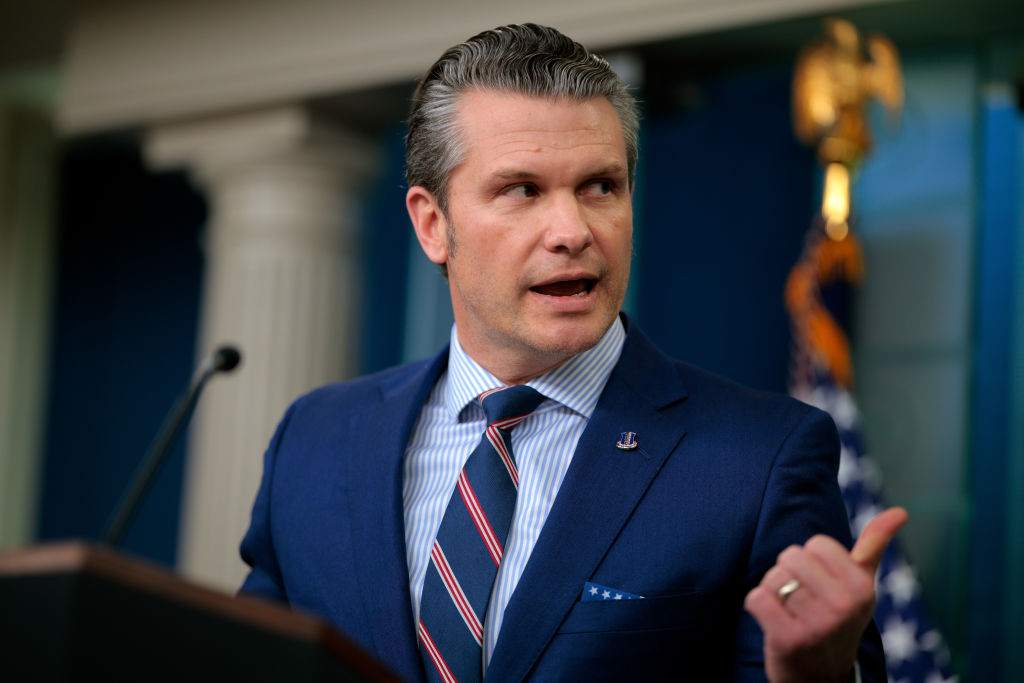
To be clear, Trump’s victory wasn’t just an election loss for the majority of American women who voted against him; it was a cultural rejection of female power facilitated in large part by the manosphere—a toxic, hyper-masculine echo chamber of podcasters, influencers, and bloggers who have spent years weaponizing misogyny. Their movement laid the groundwork for this moment, and right now, it feels like they’ve won.
A little history
The manosphere gained early visibility during flashpoints like GamerGate in 2014, where online harassment campaigns targeted women in gaming and tech, and the horrifying 2014 Isla Vista shootings by Elliot Rodger, who left behind a manifesto filled with misogynistic grievances. These events reflected a growing backlash to the rise of feminist blogs like Jezebel, the increasing mainstreaming of feminism, and women’s voices being amplified in previously male-dominated spaces. This toxic ecosystem grew to include communities like incels (involuntary celibates), Men Going Their Own Way (MGTOW), and Men’s Rights Activists (MRAs), which have long framed feminism as a threat to their identity and power.
But as I sit with the weight of it all, one thing has become clear: if we are going to successfully combat this backlash, we have to build something stronger than outrage alone. Online activism has played a critical role in mobilization and awareness for progressive causes—just as it has for the manosphere—but it’s not enough on its own to win. We need spaces for women in every arena: online, in real life, in activism, in community, and in joy.
We need a womansphere. Because the antidote to the manosphere isn’t just resistance—it’s connection.
The manosphere certainly creates connections but around the worst things. Modern-day manosphere leaders like “alpha” strongman Elliott Hulse, who preaches male dominance and rails against feminism, and far-right provocateur Nick Fuentes, the “your body, my choice” jackass who never met a nazi salute he didn’t like, exploit this resentment toward women, promoting hyper-masculinity as a cure-all for a world they claim is dominated by “woke” ideologies. Their messaging finds fertile ground in online forums like 4chan and Reddit, where misogyny and grievance politics are celebrated. Figures like Andrew Tate openly normalize violence against women, while he currently awaits trial on human trafficking and rape charges.
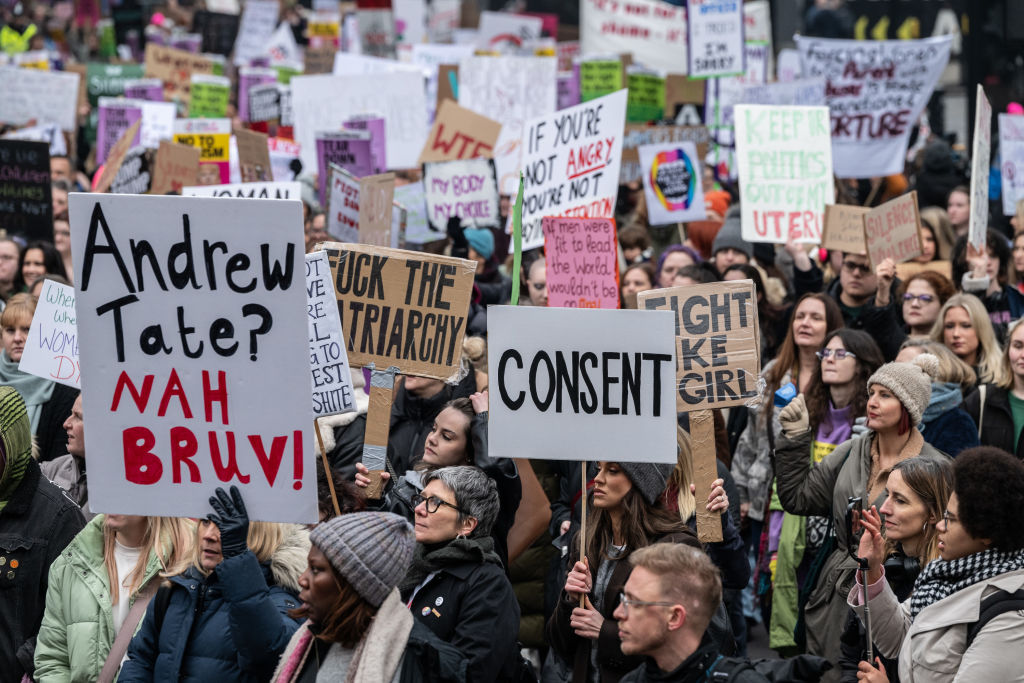
The manosphere now actively recruits vulnerable young men through everything from bodybuilding forums to gaming livestreams, and thrives on creating enemies: women, feminism, and anyone challenging the status quo. Fear, blame, and division remain the cheap fuel that powers this system, pulling in disillusioned men and weaponizing their grievances against progress.
After the election, it felt as if the manosphere was unstoppable. But then I received an invitation to attend a meeting in San Jose with a group called the Gigis, a community created for “midlife women to gather, grow, and give back.” This regular gathering of nearly 60 women wanted me to lead them in a discussion about what they could do in the aftermath of the election. During our two-hour meeting, some of the women said they were exploring a run for office. Others were starting nonprofit organizations to serve their neighbors. And others were going back to school to hone their activism skills. But all of the Gigis were committed to coming together to encourage each other to keep going.
Like the manosphere, this is a community, and the point of communities—of all types—is to help us find our purpose, test and hone our values, and be a part of something greater than ourselves. I’ve seen firsthand through Moms Demand Action that communities are where the real change happens—in ourselves and in the world. Not only is Moms Demand Action one of the largest grassroots organizations in the nation, but it’s also the largest real-life laboratory for helping women find their people and, in turn, their power. And that’s where we need to focus our energy: on creating in-person spaces that inspire connection and collective action. Unlike the manosphere, which thrives online by feeding on anger and fear, what I’m advocating for is grounded in real, face-to-face relationships, that foster compassion and collaboration. That’s the crucial difference between their network and what I’m calling the womansphere—we don’t just build ideas, we build bonds.
The manosphere understands that people crave belonging, even if their version rallies around a fear of inadequacy. But a healthy community—even if it’s just a handful of people—can help us feel connected to others and feel like we're part of something larger than ourselves. The manosphere thrives on reinforcing outdated power structures. The womansphere reimagines them entirely, creating a space for equity, inclusivity, and growth. Online and offline, where women can connect without fear.
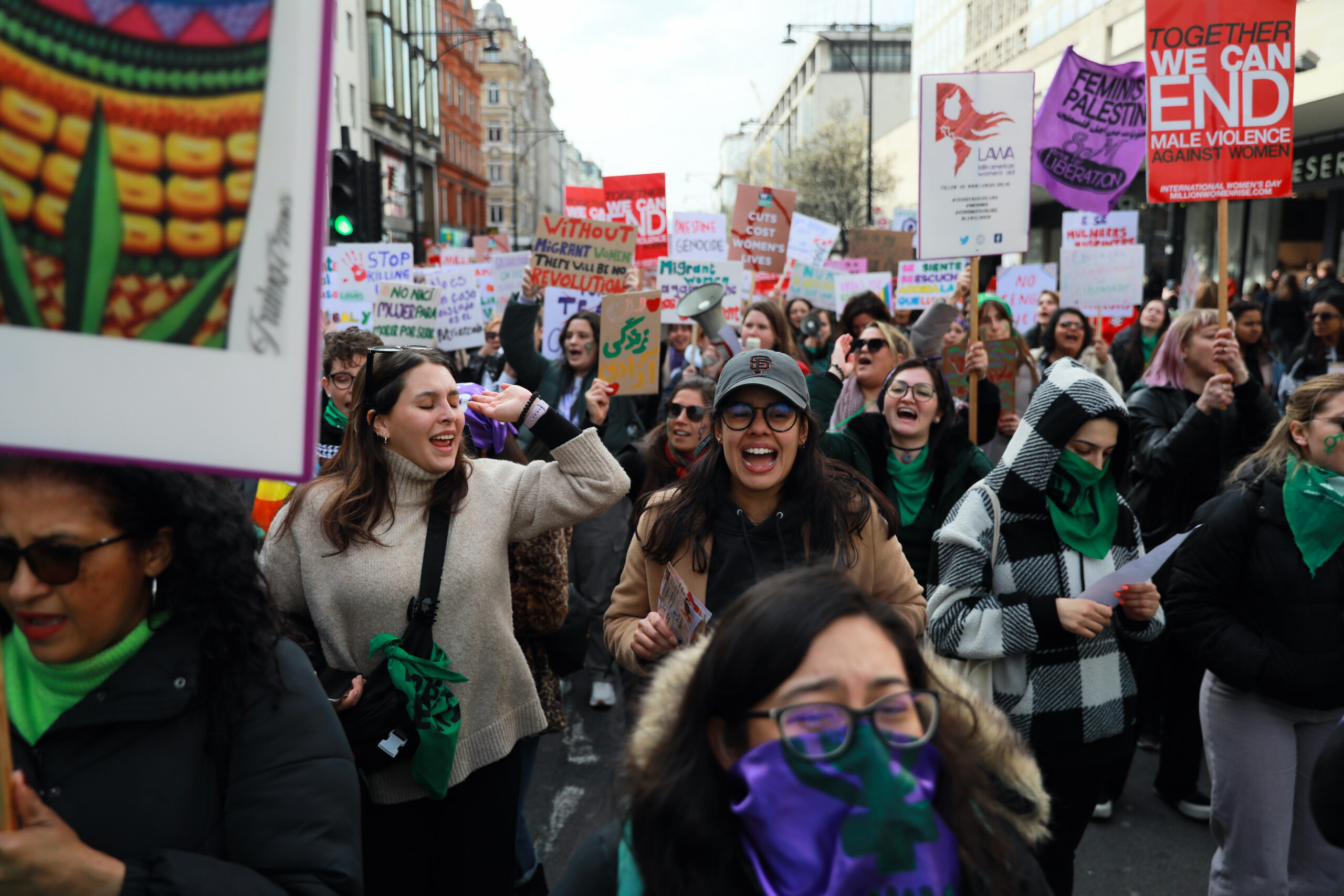
Sitting with the Gigis—knowing that women everywhere, of all different walks, are meeting in their own groups—I realized that the most effective resistance to the Trump administration won’t be en masse, but underground—and it will start in small communities. We need a womansphere where we can come together in person from all walks of life to feel empowered, supported, and seen. We need in-person communities where women can have conversations, despite their levels of education or political views. We need more media and platforms to lift up women’s stories, leadership, and solutions. We need to celebrate and center diverse leadership and lived experiences. And we need to create a womansphere that is as loud and visible as the manosphere, but infinitely more constructive.
To be clear, I’m not talking about the existing “tradwife” communities, where women advocate for a return to regressive, hyper-traditional gender roles and use “feminine wiles” as power. Our womansphere is about real progress, inclusivity, and collaboration—not performative or nostalgic ideas of femininity. The womansphere isn’t just a rejection of toxicity; it’s a blueprint for a better, inclusive future.
The manosphere won’t go down without a weird, gross fight. Right now, they’re gloating, emboldened by political wins and all those inaugural ball invitations. But that’s all the more reason to double down on creating an alternative. In this moment, women, as always, face the harder job. Instead of tearing things down, we’re tasked with building something meaningful, something that endures. We need to work towards something, not against it. And while feminist spaces have historically had their own moments of conflict and division, this new womansphere can learn from the past and make constructive collaboration its guiding principle.
Build your community. Find your people. Start the conversation. This isn’t about perfection; it’s about progress. The womansphere starts now, and it starts with us.
And seriously, our content is way better anyway. Here are a few ways to enter the womansphere:
Podcasts
- America, Who Hurt You?
- Pulling the Thread
- The Amendment
- News Not Noise
- My So-Called Midlife with Reshma Saujani
- Not Gonna Lie with Kylie Kelce
- UNDISTRACTED, with Brittany Packnett Cunningham
Mission Driven Groups
- National Women's Defense League, a nonpartisan organization dedicated to preventing sexual harassment and protecting survivors.
- TOGETHXR, a media and commerce group founded by some of the world’s greatest athletes.
- Women in AI (WAI), a nonprofit do-tank working towards inclusive AI that benefits global society.
- Project Dandelion, a women-led global campaign for climate justice.
- GenderLib, an emergent and innovative grassroots and volunteer-run national collective that builds direct action, media, and policy interventions centering bodily autonomy
- Moms First, grassroots community of moms and supporters taking action in their homes, workplaces, and communities.
Inclusive Journalism:
- The Persistent, a digital journalism platform committed to amplifying women's voices, stories, ideas, and perspectives.
- The 19th News, an independent, nonprofit newsroom reporting on gender, politics and policy.
- them, the award-winning authority on what it means to be LGBTQ+ today — and tomorrow.
- The Gist, a women-led, inclusive, and empowering sports community made for everyone.
- The Meteor, a multimedia company centering the lives of women, girls and nonbinary people. (Hi, that’s us!)
Social Media Darlings:
Emily Amick (@emilyinyourphone)
Your Virtual Anti-Disinformation Bestie (@the.wellness.therapist)
Becca Rea-Tucker (@thesweetfeminist)

Shannon Watts is an author, organizer, and speaker. She founded Moms Demand Action and recently organized one of the largest Zoom gatherings in history, mobilizing women voters for the 2024 Kamala Harris campaign. Her new book Fired Up is coming in 2025.
“You can’t rewrite a statute with a Sharpie”
January 30, 2025NEWS,NEWSLETTER
 January 30, 2025 Greetings, Meteor readers, Too much is happening at once.  In today’s newsletter, we take a close look at the many anti-DEI actions Trump has put in motion, and what they mean in real life. Plus, what to expect at this year’s Grammys. Resting my eyes, Shannon Melero  WHAT'S GOING ONThe ripple effects of the DEI crackdown: The morning after the aircraft collision over the Potomac River on Wednesday night, Trump was busy blaming the DEI policies of Biden and Obama for the crash. “Their policy was horrible,” he said, “and their politics was [sic] even worse.” His evidence-free rant is just the latest move of his administration’s obsessive, all-out assault on diversity, equity, and inclusion programs. So what do Trump’s slew of executive orders, freezes, and attacks on programs that help people of color, women, and LGBTQ+ people thrive actually mean? Before we parse out what we should expect, let’s first review what’s happened. On his very first day, Trump overturned Biden’s executive order on DEI, which, among other things, ordered all federal agencies to come up with equity action plans, which address discrimination in the workplace. The second Trump executive order, handed down the same day, went further, ending any DEI activities in the federal government and reversing core policies that have been around for decades, including a Lyndon B. Johnson-era order that required any workplace taking federal dollars to implement equal opportunity measures. The Trump administration made clear just how much they mean it: Tens of thousands of federal employees got an email directing them to report any colleagues trying to “disguise” DEI “by using coded or imprecise language” and promising that they’d face “adverse consequences” if they didn’t. This effort extends throughout the government. The Department of Justice was ordered to halt ongoing cases in its civil rights division, including police reform agreements negotiated in the final days of the Biden administration. The Department of Education removed more than 200 web pages with guidance for schools on how to implement DEI policies and create welcoming campus environments. And just last night, Trump issued an order that threatened to remove federal funding from schools teaching about things like transgender identity, white privilege, and unconscious bias (though it’s unclear how much of this will actually happen, given how difficult it is for the federal government to dictate curricula.) So, are you ready for the hopeful part? “These executive orders cannot change civil rights law,” says Amalea Smirniotopoulos, senior policy counsel at the NAACP’s Legal Defense Fund. “You can’t rewrite a statute with a Sharpie.” That means that hiring, say, only white people is still illegal. Denying a woman a promotion just because of her gender is still illegal. Firing someone for being gay is still illegal, even according to the rightwing Supreme Court. Which also means that if any federal employee experiences discrimination or workplace harassment, they still have rights under Title VII of the Civil Rights Act and can file a lawsuit against the federal government. And despite the administration’s attempt to frame DEI programs as “illegal and immoral,” the programs it’s ending “are lawful and have been upheld by courts in many cases,” says Smirniotopoulos, pointing to the NAACP’s success in winning an injunction to stop an anti-DEI executive order issued by Trump during his first term. She predicts these newer orders will face challenges, too. But that doesn’t mean this crackdown won’t have far-reaching effects. There’s the law, and then there’s enforcement. “The reason DEI programs exist in the first place is to help with compliance of civil rights laws,” Smirniotopoulos says. “If we see the federal government roll them back, there is a risk that they’ll allow discrimination to fester among their own workforce.” In other words, you’re still free to file a lawsuit alleging discrimination—but the guardrails and systems that might discourage discrimination to begin with may be deteriorating. This deterioration could be widespread, given how the current administration is “encouraging” the private sector to roll back DEI. Since the election, many private companies—from Walmart to McDonald’s to Amazon—already have. Anti-DEI efforts will also rob federal employees of things like volunteer affinity groups. “Employees are feeling that the loss of these programs [will deprive] them of community and the social network that’s essential in any workplace,” Smirniotopoulos says. “Your ability to succeed in your workplace isn’t just about your raw intelligence, it’s also about knowing how to navigate workplace dynamics, knowing the culture and norms. Those social factors can play just as much of a role in whether someone can thrive or get promoted.” For the federal government, the ultimate effect may be a working environment where swaths of the population feel unwelcome—which will hurt hiring and retention for government positions. (Many suspect this is part of the point; the president of the American Federation of Government Employees called the anti-DEI orders “a smokescreen for firing civil servants.”) A diminished federal workforce affects everything from getting through airport security quickly to making sure we have clean water. “When the federal government works well, it’s invisible,” Smirniotopoulos says. “When the federal workforce is attacked, that ultimately hurts all of us.” If you’re experiencing workplace discrimination or harassment: The Equal Opportunity Employment Commission technically still exists, but to be safe, we recommend contacting independent organizations like the ACLU, NAACP, or National Women’s Law Center to get advice on how to proceed. —Nona Willis Aronowitz AND:
 Two Pop Stars, Both Alike in DignityBeyoncé and Taylor Swift face off at the GrammysBY SCARLETT HARRIS  IN FAIR LOS ANGELES WHERE WE LAY OUR SCENE, FROM ANCIENT GRUDGE BREAK TO NEW MUTINY. (VIA GETTY IMAGES) It’s been an incredible year for women in pop, and this weekend at the 67th Grammy Awards the race for the highly coveted Album of the Year award is stacked with the gals who ruled the summer. Billie Eilish, Sabrina Carpenter, Chappell Roan, and Charlie XCX are among the nominees. And while each of these women has a strong chance of taking home the gold, the real competition is between two titans of the industry—Taylor Swift and Beyoncé, who have 157 nominations and 46 wins between them. This weekend promises to be a kind of referendum on the notoriously racist and old-fashioned music establishment. All eyes will be on whether Bey, with “Cowboy Carter,” can finally clinch the Album of the Year award that has eluded her her entire career—or whether Grammy darling, Swift, will add to her already record-breaking tally of four AOTY golden gramophones with “The Tortured Poets Department.” The last time they were pitted against each other in this category was at the 2010 Grammys, for “I Am… Sasha Fierce” and “Fearless,” respectively, which Swift went on to win. This followed Kanye West’s infamous “I’mma let you finish” screed at the MTV Video Music Awards the year prior, in which he interrupted Swift’s acceptance speech for Best Female Video for “You Belong With Me,” asserting that Beyoncé had one of the best videos of all time and should have won for “Single Ladies (Put a Ring On It).” (He wasn’t wrong.) Ever the consummate professional, Bey had invited a deer-in-the-headlights, 19-year-old Swift back on stage during her own acceptance for Video of the Year so she could give the speech truncated by West.  WEEKEND READING 📚On stoking division: Anti-immigration policies are creating a wider divide in already fragile Latine communities. One Mexican/Puerto Rican writer shares what that looks like for her family. (New York Times) On letting the dead rest: A new documentary about Selena Quintanilla called Selena y Los Dinos has some wondering where to draw the line between honoring late artists and profiting off their tragic stories. (Refinery 29) On sex and other cities: A new character has emerged from the manosphere: the “passport bro.” While that may sound like a cool name for travel buddies, it’s just the latest depraved rebrand of sex tourism. (The Baffler)  FOLLOW THE METEOR Thank you for reading The Meteor! Got this from a friend? Sign up for your own copy, sent Tuesdays and Thursdays.
|
![]()
Two Pop Stars, Both Alike in Dignity
Beyoncé and Taylor Swift face off at the Grammys
BY SCARLETT HARRIS
It’s been an incredible year for women in pop, and this weekend at the 67th Grammy Awards the race for the highly coveted Album of the Year award is stacked with the gals who ruled the summer. Billie Eilish, Sabrina Carpenter, Chappell Roan, and Charlie XCX are among the nominees. And while each of these women has a strong chance of taking home the gold, the real competition is between two titans of the industry—Taylor Swift and Beyoncé, who have 157 nominations and 46 wins between them.
This weekend promises to be a kind of referendum on the notoriously racist and old-fashioned music establishment. All eyes will be on whether Bey, with “Cowboy Carter,” can finally clinch the Album of the Year award that has eluded her her entire career—or whether Grammy darling, Swift, will add to her already record-breaking tally of four AOTY golden gramophones with “The Tortured Poets Department.”
The last time they were pitted against each other in this category was at the 2010 Grammys, for “I Am… Sasha Fierce” and “Fearless,” respectively, which Swift went on to win. This followed Kanye West’s infamous “I’mma let you finish” screed at the MTV Video Music Awards the year prior, in which he interrupted Swift’s acceptance speech for Best Female Video for “You Belong With Me,” asserting that Beyoncé had one of the best videos of all time and should have won for “Single Ladies (Put a Ring On It).” (He wasn’t wrong.) Ever the consummate professional, Bey had invited a deer-in-the-headlights, 19-year-old Swift back on stage during her own acceptance for Video of the Year so she could give the speech truncated by West.
The two have been eerily linked ever since: fans noticed Beyoncé dropped her groundbreaking self-titled visual album at midnight on Swift’s birthday in 2013. The streaming debut of Swift’s The Eras Tour concert film was released on the 10th anniversary of that self-titled album. (Queen Bey showed up to the film’s red carpet premiere, quashing any lingering rumors of beef between the two.) They are the only two women to debut a single at number one on the country charts. And both dominated the cultural conversation in 2024, a year full of women taking back and transforming pop music.
Despite pretty much every other awards body and cultural arbiter giving Bey her dues, and despite a trio of standout albums in BEYONCÉ, Lemonade, and Renaissance, the Grammys routinely withholds AOTY from her (this is her fifth nomination). As writer Kathleen Newman-Bremang explained last year—after Jay-Z accepted the Dr. Dre Global Impact Awards at the Grammys and slammed the Academy in his acceptance speech— Black music is often relegated to the genre categories like R&B, rap, and dance, which Renaissance won in in 2023. Albums by Black women seldom win the general categories like Album of the Year—which was last won by a Black woman in 1999 with The Miseducation of Lauryn Hill.
“[Calling] Black artists the greatest of all time… would require admitting the power of Black art, it would require acknowledging the history of cultural pillaging and musical theft of Black work that the industry was built on,” Newman-Bremang wrote at the time.
Cowboy Carter is a direct response to that kind of racism in the industry, featuring Linda Martell, a Black country pioneer, and her modern-day contemporaries Shaboozey, Tanner Adell, Brittney Spencer, Tiera Kennedy and Reyna Roberts. Despite being her most critically polarizing album in over a decade, Bey will probably win for what is, in my opinion, her weakest body of work since 4. That is if Swift doesn’t best her for the similarly conflictingly reviewed and unwieldy The Tortured Poets Department.
Of course, Grammy voters might surprise us and hand the award over to one of the freshly crowned pop princesses, like Sabrina Carpenter or Chappell Roan. But the fact that Beyoncé will actually be attending the award ceremony this year tells me she expects to be leaving with some hardware. Or perhaps everyone’s just there to have a good time and we’ll still be waiting for an AOTY award in another 15 years (you know, if society holds up in the meantime).
Donald Trump Signs Laken Riley Act Into Law
Originally published on January 24.
Updated January 30.
Donald Trump has signed the Laken Riley Act into law, making it the first of his second term. During the signing, Trump also announced his intentions to authorize ICE to detain migrants at Guantanamo Bay, where he claimed there are "30,000 beds to detain the worst criminal aliens threatening the American people." Secretary of Defense Pete Hegseth praised the decision on Fox News, referring to it as a humane option to manage deportations. But according to Vince Warren, executive director of the Center for Constitutional Rights, "The facility is decrepit. It's been falling apart. It's in disrepair...And, as a practical matter, the conditions that would be created if people went there would be so substandard that it would give people opportunities to file lawsuits around the conditions of their confinement while they're being deported."
Congress passed the Laken Riley Act just last week. Named for a young woman in Georgia who was killed by a Venezuelan undocumented immigrant, it was slated to be among the first laws passed by Trump's administration (although his hand must be tired from the other stuff he’s been signing) and it is ominously fitting that the first piece of legislation he executes is an anti-immigration bill.
So what’s in it? The top line item is that any undocumented immigrant accused of non-violent crimes like theft, either in the U.S. or their home country, will now be subject to mandatory indefinite detention by ICE. They will not be allowed bond hearings in their criminal case and, once in ICE custody, can be held until deportation, which will be the most likely outcome if they’re unable to leave the detention center for preliminary trial hearings. The bill also allows for state attorneys general to sue the federal government on behalf of residents who believe they’ve been harmed by immigration policies.
To be clear, there are already policies in place for detaining and deporting convicted violent offenders. But this bill expands those policies to include anyone arrested or charged with “theft, larceny, burglary, shoplifting” or assault against a law enforcement officer, regardless of any conviction or lack thereof. “What's dangerous about this bill is that it takes away some of the basic fundamental due process tenets of our legal system," one legal expert told NPR.
This bill is a direct response to the particulars of Laken Riley’s case: The man who murdered her had previously been charged with shoplifting, and supporters of the bill argue that had he been deported after that minor crime, Laken Riley would still be alive. That is possible—but overriding the Fifth Amendment for a vast number of people is not a sensible way to protect women from being murdered. (Riley was one of the roughly 2000 women killed by men in this country every year. Fortunately, in response to these crimes, two years ago, the White House formed the first-ever government plan to end gender-based violence… Oh, wait.)
The Laken Riley Act isn’t just a GOP favorite; 12 Democrats voted for it, too—see which here—which shows just how many people believe that immigrants to the U.S. commit more crimes than its citizens. (Which, of course, is demonstrably false.) Immigrants have long been used by the GOP as boogeyman responsible for America’s troubles, and now they’ve got the tools they need to disappear as many as possible.



